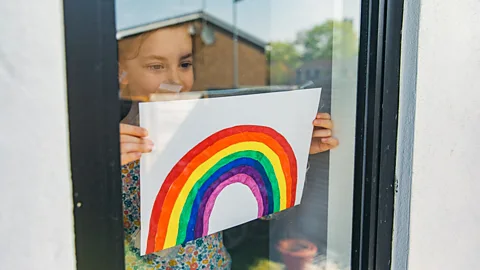The unsettling power of existential dread
 Getty
GettyWorrying about threats to our lives and societies is stressful. It may also change how we think, in unsettling ways.
If you’ve even glanced at the headlines recently, you’ll probably have found yourself questioning the future of your very existence. On the back of the Covid-19 pandemic, we saw the international outbreaks of monkeypox. Russia’s invasion of Ukraine has increased the risk of a global nuclear war, with increasingly threatening rhetoric from Vladimir Putin. And extreme weather events have brought home the harsh realities of the climate emergency.
It is natural to wonder whether the anxiety aroused by these daily headlines could shape the way we think and act – and studies of “existential psychology” appear to show that this is indeed the case. Besides making us feel depressed and stressed, the constant reminders of the threats to ourselves and our society may lead us to become more closed-minded and dogmatic in our opinions, and they can render us more susceptible to conspiracy theories as we search for meaning in the uncertainty.
Fortunately, there may also be a silver lining, with some tantalising evidence that some people can channel their existential anxiety more constructively into creative pursuits, with positive consequences for themselves and the people around them.
Managing terror
Our understanding of experimental existential psychology began with the emergence of “terror management theory” in the late 1980s. The theory was primarily concerned with the most basic existential crisis – thoughts of our own death – which, the psychologists proposed, would lead us to seek solace in our group identity and culture.
In their view, feeling that we are part of something that is bigger than ourselves and longer-lasting – such as our nationality, our religion or our preferred political allegiance – can give our lives a sense of meaning, so that the thought of death would be less scary. We may express this with polarised and dogmatic opinions that support our group identity, and hostility to outsiders, resulting in less nuanced and more polarised thinking.
In a typical experiment, the psychologists would first ask the participants to write about what they thought would happen when they die. The control group, meanwhile, would write about something extremely unpleasant such as dental pain – aversive topics that would not necessarily lead them to consider the fragility of their existence.
After a delay, the participants would then be presented with a text that either supported or contradicted their culture in some way. If they were US citizens, for example, they might read an essay that celebrated American liberty, or one that highlighted US economic inequality. They would then be asked to mark the essay on the quality of the writing and its argument, and how much they would like to meet the author.
Initially, the psychologists seemed to find good evidence for the expected effects: participants who had been reminded of their mortality tended to view the essayists who had supported their culture far more positively, while taking a more negative attitude toward the essayists who had criticised it.
The past few years, however, have seen considerable debate about the quality of the studies and the reliability of the results, with some research teams struggling to replicate the same findings. “I would say that the data we have is inconclusive,” says Simon Schindler, an applied social psychologist at Leuphana University of Lüneburg, Germany, who has investigated terror-management theory.
One possible explanation for the contradictory findings is that the laboratory manipulations often fail to provoke strong enough feelings of existential angst to change behaviour, whereas the effects may be more pronounced in real life.
Along these lines, one study found that people do become more polarised in their opinions after events, such as serious illness, that lead them to recognise the vulnerability of existence.
 Getty
GettySeeking certainty
Another exciting strategy to untangle the effects of existential angst involves analysing people’s reactions to global crises, using enormous data sets from social media websites. Consider a recent paper by Almog Simchon as part of his PhD at Ben-Gurion University in Israel under the supervision of the social psychologist Michael Gilead.
His goal was to understand how people’s attitudes change in response to the existential threat of acts of terror, which he explored through textual analyses of more than 2.5 million tweets between 2016 and 2018. This period included the shooting at the Pulse nightclub in Orlando, Florida, in June 2016, the shooting at Florida’s Fort Lauderdale Airport in January 2017 and the bombing of the Manchester Arena in May 2017.
To measure people’s opinions over this time, he turned to some classic linguistic markers of certainty – such as the word “absolutely”, “never”, “clearly, “extremely” or “undeniable”. “They don't leave any room for nuance,” explains Simchon, who is now based at the University of Bristol, UK.
Counting the frequency of these words in the regions most immediately affected by the attacks, he noted a significant increase – of more than 20% – in people’s linguistic certainty following each of the events. Although Simchon’s analyses did not examine the subject of people’s tweets, it looked like their beliefs, in general, were becoming more dogmatic and less nuanced as a response to the event.
To replicate his finding, Simchon examined the effects of the Covid-19 pandemic. This time, he focused his analysis on 800,000 tweets, published between 25 February and 15 April 2020 in New York – the US state with the highest death rate. As expected, he found a sharp rise in the certainty words as people confronted the daily danger of contagion, suggesting a rise in more dogmatic attitudes.
Such findings fit well with the general principles of terror management theory. When we read about distressing events in the news, we are reminded of the fragility of our existence. As a result, we will try to ignore nuances that could add to the uncertainty. Instead, we can find comfort in expressing unambiguous ‘black-and-white’ opinions that reassert our cultural identity and worldview.
Simchon points out that similar effects can be seen in people’s beliefs in conspiracy theories, which can reduce existential angst by providing an easy-to-understand explanation for the dangers. “People are really drawn to regaining some sense of control,” Simchon says. “And if there’s a guy on Reddit claiming to know all the answers, and who to blame – that can be very attractive.”
As evidence, Jan-Willem van Prooijen, an associate professor of social psychology at VU Amsterdam in the Netherlands, has found that conspiracy theories surge particularly following distressing events that would likely elicit existential anxiety – such as acts of terror, wars and serious natural disasters. Tellingly, this seems to be most likely when an unpopular outgroup can be used as a scapegoat, accused of causing or profiteering from the threat to you and your culture.
 Getty
GettyCreative despair
It is a sad irony that these knee-jerk responses to existential threat are often counter-productive and prevent us from dealing with the dangers. Simchon points to the polarised arguments and conspiracy theories around Covid-19. When we face a crisis, we need to think flexibly and to recognise the nuances of the situation at hand – rather than seeking over-simplistic explanations and solutions. Fortunately, it is possible to channel our existential angst more constructively, with evidence that many people naturally turn the feelings of despair into acts of creation.
According to one theory, people turn to creative endeavours to quell their existential angst, as they try to contribute something meaningful to the world. This comfort could either come from the thoughts of their artistic legacy, or through the knowledge that they are helping other people and benefiting society as a whole with their innovative endeavours.
A handful of experiments appear to support this hypothesis. As ever, we will need more replications to be sure of this effect, but a recent review suggests that it is robust. Recent research, conducted by Yu-Xin Cui and colleagues at China’s Nankai University during the Covid-19 pandemic, supports this conclusion: they found that asking participants to brainstorm ideas to raise money for a charity tended to ease people’s anxieties about the rising death tolls, for example.
Rotem Perach, a senior research fellow at the University of Westminster, UK, who wrote the recent review paper, suggests that these benefits may depend on the person’s existing views. “If you already believe in creativity and pursue it as part of your lifestyle, you’ll be more likely to see an effect,” he says.
Looking back on the pandemic, it is easy to think of many anecdotal examples of creativity during crises – the explosion of murals in big cities celebrating the people who had lost their lives, for example, or the numerous singers and bands performing free lockdown concerts to cheer up their fans.
Most of us cannot simply ignore the global threats that are constantly in the news. But rather than seeking comfort in conspiracy theories or polarised thinking, we can strive to make the world around us a better place – whether that’s through art, music or technological innovation. To misquote the UK government’s motivational posters during World War Two, one of best ways to cope with existential threats may be to keep calm and create.
David Robson is a science writer and author of The Expectation Effect: How Your Mindset Can Transform Your Life, published by Canongate (UK) and Henry Holt (USA) in early 2022. He is @d_a_robson on Twitter.
